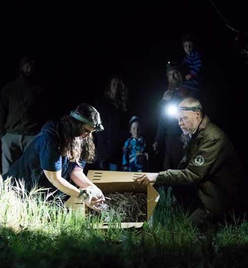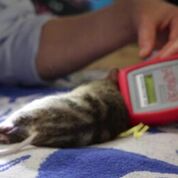
Phillip Island’s new fox-free status gives hope for one of Victoria’s most endangered species, the eastern barred bandicoot.
By Roland Pick
ON OCTOBER 20, researchers from Phillip Island Nature Parks, Zoos Victoria and the Eastern Barred Bandicoot Recovery Team released 44 bandicoots onto the Summerland Peninsula, at the western tip of Phillip Island.
This area is well known as the site of major conservation activities over several years as it was rehabilitated from a former housing estate to a natural environment which is now home to a thriving colony of little penguins, migratory short-tailed shearwaters and, if this release proves successful, eastern barred bandicoots.
Phillip Island Nature Parks’ CEO Catherine Basterfield told participants attending the pre-release launch: “Now that Phillip Island has been declared fox-free, we can give this marsupial its best chance of survival by releasing it here.”
The mainland eastern barred bandicoot (EBB) is extinct in the wild as a result of predation by foxes and the loss of almost all its native habitat. They live a solitary, secretive life foraging in open grasslands at night and resting in a shallow, cryptic nest during the day, usually in areas containing trees or shrubs. They are difficult to spot and the only sign of their presence is their small foraging digs.
In Victoria the EBB Recovery Team has built three reserves on the mainland surrounded by fox-proof fences, totalling 800 hectares. These reserves are the only places in Victoria where the bandicoots can now be found. Fox-free islands provide the best long-term opportunity to save this species from extinction.
Twenty bandicoots were released on Churchill Island in 2015 to evaluate the suitability of local conditions and to demonstrate to the community what they might expect from an EBB release. This population increased to approximately 120 animals in two years and has stabilised around this number.
The chair of the EBB recovery team, Richard Hill, said the trial showed the bandicoots could successfully establish in island environments and have positive impacts such as reduced soil compaction, and improved nutrient and water infiltration, with no observed negative effects. “This has given us the confidence to release them on Phillip Island.
Zoos Victoria CEO Dr Jenny Gray said that after 26 years of a captive breeding program, there was optimism that the release of bandicoots onto Phillip Island would boost the wild population beyond fenced sites across Victoria.
Nature Parks deputy research manager and project lead Dr Duncan Sutherland takes up the story:
“We had a successful catch at Churchill Island last week [early November] to collect the remaining EBBs coming from there for release to Summerland Peninsula, Phillip Island. In all we trapped 64 and collected 11 females and 6 males for translocation, bringing the total to 20 males and 20 females from Churchill Island and 61 individuals released to Summerlands so far. There are still plans for a catch at Hamilton in the future.
“Our radiotracking of 30 bandicoots following their release has concluded. The transmitters began falling off the tails of bandicoots at about one week and all but two transmitters had been retrieved, fallen off, after two weeks. We had one mortality recorded in this time, a truly tragic end as a male found an long-abandoned underground tank in the old Summerlands housing estate and could not escape. The tank has been filled in so this can’t happen there again.
“Significantly, that means no known mortality related to feral cats immediately after release. All of the animals have stayed pretty close to their release site.
ON OCTOBER 20, researchers from Phillip Island Nature Parks, Zoos Victoria and the Eastern Barred Bandicoot Recovery Team released 44 bandicoots onto the Summerland Peninsula, at the western tip of Phillip Island.
This area is well known as the site of major conservation activities over several years as it was rehabilitated from a former housing estate to a natural environment which is now home to a thriving colony of little penguins, migratory short-tailed shearwaters and, if this release proves successful, eastern barred bandicoots.
Phillip Island Nature Parks’ CEO Catherine Basterfield told participants attending the pre-release launch: “Now that Phillip Island has been declared fox-free, we can give this marsupial its best chance of survival by releasing it here.”
The mainland eastern barred bandicoot (EBB) is extinct in the wild as a result of predation by foxes and the loss of almost all its native habitat. They live a solitary, secretive life foraging in open grasslands at night and resting in a shallow, cryptic nest during the day, usually in areas containing trees or shrubs. They are difficult to spot and the only sign of their presence is their small foraging digs.
In Victoria the EBB Recovery Team has built three reserves on the mainland surrounded by fox-proof fences, totalling 800 hectares. These reserves are the only places in Victoria where the bandicoots can now be found. Fox-free islands provide the best long-term opportunity to save this species from extinction.
Twenty bandicoots were released on Churchill Island in 2015 to evaluate the suitability of local conditions and to demonstrate to the community what they might expect from an EBB release. This population increased to approximately 120 animals in two years and has stabilised around this number.
The chair of the EBB recovery team, Richard Hill, said the trial showed the bandicoots could successfully establish in island environments and have positive impacts such as reduced soil compaction, and improved nutrient and water infiltration, with no observed negative effects. “This has given us the confidence to release them on Phillip Island.
Zoos Victoria CEO Dr Jenny Gray said that after 26 years of a captive breeding program, there was optimism that the release of bandicoots onto Phillip Island would boost the wild population beyond fenced sites across Victoria.
Nature Parks deputy research manager and project lead Dr Duncan Sutherland takes up the story:
“We had a successful catch at Churchill Island last week [early November] to collect the remaining EBBs coming from there for release to Summerland Peninsula, Phillip Island. In all we trapped 64 and collected 11 females and 6 males for translocation, bringing the total to 20 males and 20 females from Churchill Island and 61 individuals released to Summerlands so far. There are still plans for a catch at Hamilton in the future.
“Our radiotracking of 30 bandicoots following their release has concluded. The transmitters began falling off the tails of bandicoots at about one week and all but two transmitters had been retrieved, fallen off, after two weeks. We had one mortality recorded in this time, a truly tragic end as a male found an long-abandoned underground tank in the old Summerlands housing estate and could not escape. The tank has been filled in so this can’t happen there again.
“Significantly, that means no known mortality related to feral cats immediately after release. All of the animals have stayed pretty close to their release site.
 Video footage of release of eastern barred bandicoots onto Summerland Peninsula
Video footage of release of eastern barred bandicoots onto Summerland Peninsula “Last night [November 13] we began our first monitoring session with live trapping of EBBs on Summerland Peninsula. This is an amazing site to work in – it’s a reclaimed housing estate that has been fully restored to be habitat for wildlife including penguins, shearwaters, wallabies, Cape Barren geese and now eastern barred bandicoots.
“We had a great night capturing 22 bandicoots and sent 13 to our vet team that were out in the field with us. These animals were all bled so we can test if they have been exposed to the disease Toxoplasmosis. Encouragingly, of the 12 females captured last night, five had tiny pouch young that must have been conceived on Summerland Peninsula.
“The good body condition and weight of all the animals also suggests conditions are suiting them in their new home!”
“We had a great night capturing 22 bandicoots and sent 13 to our vet team that were out in the field with us. These animals were all bled so we can test if they have been exposed to the disease Toxoplasmosis. Encouragingly, of the 12 females captured last night, five had tiny pouch young that must have been conceived on Summerland Peninsula.
“The good body condition and weight of all the animals also suggests conditions are suiting them in their new home!”